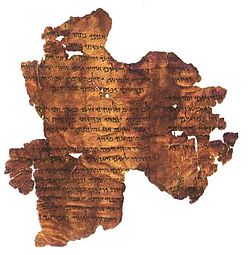| Hosea 10 | |
|---|---|
 4Q166 "The Hosea Commentary Scroll", late first century B.C. | |
| Book | Book of Hosea |
| Category | Nevi'im |
| Christian Bible part | Old Testament |
| Order in the Christian part | 28 |
Hosea 10 is the tenth chapter of the Book of Hosea in the Hebrew Bible or the Old Testament of the Christian Bible. [1] [2] In the Hebrew Bible it is a part of the Book of the Twelve Minor Prophets. [3] [4] This chapter contains prophecies attributed to the prophet Hosea, son of Beeri, dated by the Jamieson-Fausset-Brown Bible Commentary to the period between Shalmaneser V's first and second invasions of Israel. Israel is reproved and threatened for its impiety and idolatry, and exhorted to repentance (cf. Hosea 10:14; Hosea 10:6 referring to Hoshea's calling pharaoh So of Egypt to his aid; also Hosea 10:4, 13). [5]
